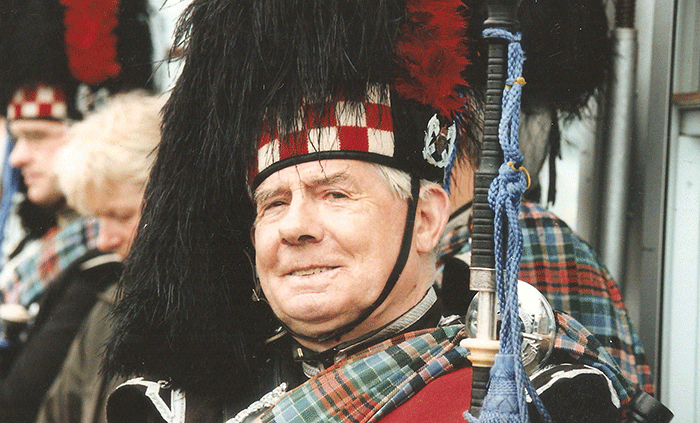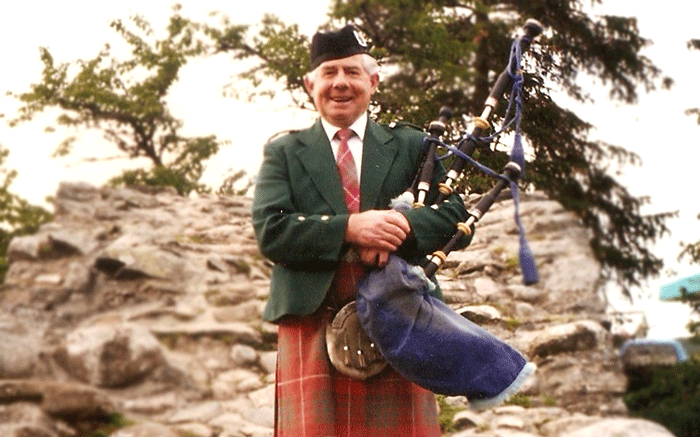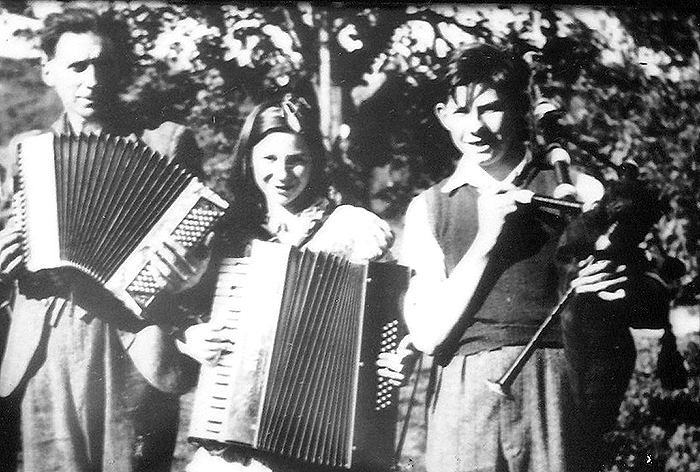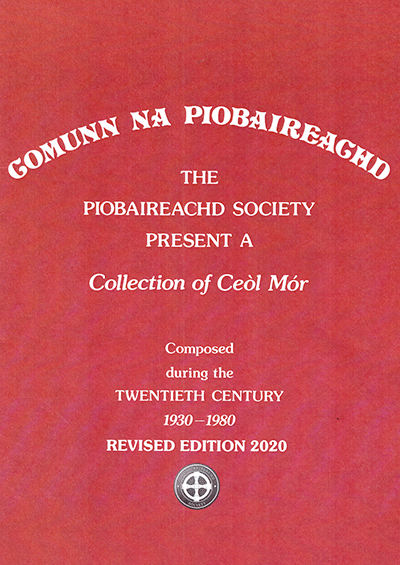
It is with sadness that it was learned that Ian Fraser, affectionately known as ‘The Sheriff’, passed away in a care home in Grantown-on-Spey, Moray. Ian had celebrated his 90th birthday in December 2019.
For many years he had a small agricultural holding at West Forigen, near Carrbridge, Inverness-shire. His parents had been there before he took over its running.
His piping teachers were among the best: Pipe Major William Ross and RB Nicol, who visited the Badenoch area to give lessons, and also Sheriff JP Grant, Rothiemurchus. He was on a Pipe Major’s course at Bridge of Don Barracks, Aberdeen, when Pipe Major Donald MacLeod was stationed there.
Ian featured in the prize lists of the Highland Society of London’s Gold Medal piobaireachd competition at the Northern Meeting on two occasions, the second in 1966. It should be appreciated that he was a man who worked on the land and had the fingers of a person who did manual work. Each summer he could be found playing for the dancing at Nethybridge Highland Games and did this duty for 30 years.
Ian served in the Cameron Highlanders doing his National Service between 1952 and 1954. In 1958 Lt. Col. David Murray, an officer in the Camerons, persuaded him to re-enlist and he remained in the colours until 1961 during which time he underwent the Pipe Major’s Course as indicated.

Ian was involved in an event which has entered piping lore. In 1958 he was part of an Army contingent of about 80 under the command of Lt. Col. Murray, then a training officer at Cameron Barracks, Inverness.
The troops went on a route march taking them through the hills between Laggan and Fort Augustus negotiating the 2,400ft Corrieyairack Pass on the way. The distance is about 18 miles covering beautiful landscape with rough terrain to negotiate. A goods day’s walk apparently.
With Ian in this contingent were fellow pipers Iain MacFadyen and Jock Smart. The weather deteriorated when above the snow line with wind and rain hampering progress; the troops got a good soaking. The pipers were ordered to play to keep up the spirits of the men.

The pipes did not escape the weather however, to the extent that the cane reeds become unplayable. Then a mist came down making directions more difficult. In an odd occurrence, two ptarmigan appeared and seemingly led the party some distance and Ian, being a hill man before his soldiering, led the way by following the birds.
David Murray, who had been bringing up the rear, caught up with the leaders and shouted ‘Can you see the path?’ To which Ian replied ‘I’m following the birds sir!’ Sure enough there were the two birds still walking sedately ahead.
The mist clearing, the birds took flight, the squad still a good distance from their destination at Garvamore. On arrival the cook had tea and a hearty hot meal of some kind of stew ready for them.
David Murray asked the cook how he managed this when he had no idea of when the squad would be arriving. The cook’s response was that he had heard the bagpipe in the distance, a clear signal to them to get the rations heated.
But the pipers had given up playing a long distance back and could not have been responsible for the signal. David had previously learned from Sheriff Grant of a piece of local folklore that on misty evenings as darkness fell a body of armed men had been seen hurrying over the pass and were suspected of being ghosts of Montrose’s army on their daring and famous night march to Inverlochy.
Sheriff Grant, learning that Lt. Col. Murray was to command the planned exercise over the same route, told him of the tale and said, ‘If anybody sees them, it’ll be you David, a Highland soldier’.
David was rather flattered with the comment until this event made him think! There was a comment along the lines of ‘Let’s get the hell out of here!’ The squad hurriedly consumed their rations and hastily made for Cameron Barracks.
In 1969 Captain John MacLellan composed a tune and entered it, successfully, in a competition for a new piobaireachd. On learning of the above story he named it ‘The Phantom Piper of the Corrieyairack’.

Ian’s nickname, apparently, came about when, if he was asked about a tune, would often respond, ‘I got it from the Sheriff’.
I recall another tale about Ian related to me by the late John Stewart, also a piper of note, and a close friend of Ian’s. Whether accurate or not, I am not sure. Ian was perhaps not the most soldierly person as regards the spit and polish of kit etc. While on a parade an officer, presumably from another regiment, mentioned that he had a rather dull belt buckle in need of cleaning. To which Ian’s response to the hapless officer was, ‘We don’t clean belt buckles in the Camerons sir!’
In all probability Ian Fraser must have been one of the last, if not the last, to have had formal teaching from Sheriff Grant. Ian was the Pipe Major of the local Grantown-on-Spey Pipe Band and was well known in the area.
Ian’s wife Bessie died in 2016. He is survived by his son Calum and daughters Kelly, Elizabeth and Frances. Our thoughts are with the family.
Duncan Watson















This is a great remembrance, filled with interesting details. . Really worthwhile reading and the pictures add to the pleasure.
Very sad to here the News about Ian, I played in the Strathspey RBL Pipe Band in the late 70’s early 80’s as a youngster and had many a good time with Ian.
P/M Donald Macleod Composed a Jig for Ian which is in one of His Books called
IAN FRASER OF FORIGEN.
It was good to read about the story of the phantom piper of the Corrieyairack. I had heard about it from a recording of the BBC Radio Scotland’s piping programme from the early 90’s, I think (?) Was the programme called “Chanter” or “Pipeline” then ? I think it was Lt. Col. David Murray that told the story, but I seem to remember that he said it was he and the the contingent of troops that heard the sound of the pipes, rather than the cook (?)